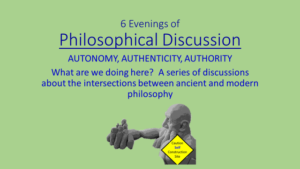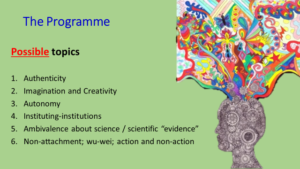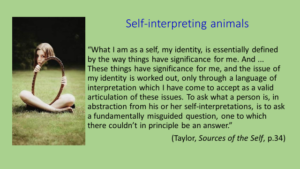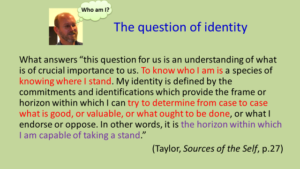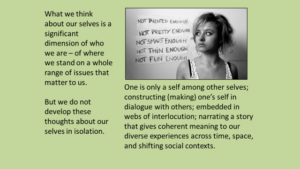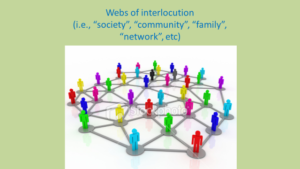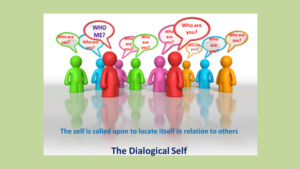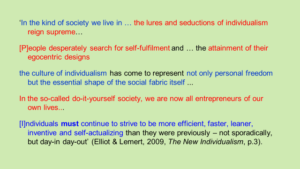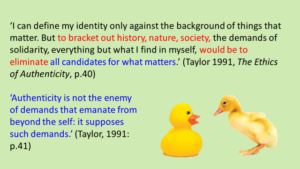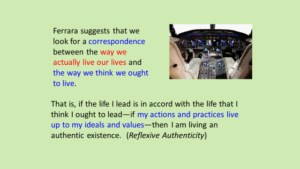Let me begin by noting that this is the second time I’ve runs a series like this – making it the second series. My promo very specifically did not say “2nd Series” or anything like that, because I didn’t want to dissuade new people from coming. This is intentionally not a continuation – you will not be disadvantaged by having not attended the first series.
But at the same time it is a continuation, in a sense. Which means that we will have to revisit some of the things already discussed in order to ensure that everyone can fully engage. Some of you might have already availed yourself of the blog about the first series. That will certainly affect the shape of the discussion. But it is not necessary for you to join in here.
Discussion is the key word here. This is a series of discussions, and as the second series there are no doubt ways in which this discussion will continue on from the previous one.
Think of it like going to a party: walking into a conversation that’s already going on.
One of the fascinating, exciting and more intimidating things about a philosophical conversation is that it has been going on for thousands of years. We’re all late comers. I started dipping in and out of it some 35 years ago, and about 25 years ago dedicated myself to it more-or-less full time.
My objective here is to introduce some aspects of this conversation – aspects that I find both intriguing and practically useful for navigating modern life. One necessary qualification is that we all come with different levels of exposure, different degrees of engagement with these ideas and issues.
Please treat all of the contributions as food for thought, rather than truth proclamations.
Let me briefly outline my proposed programme of topics.
We hear a lot about being “true to ourselves” or being “authentic” – but what does that actually mean? One implication is that there is some inner core or essence that is the “real” you, and your task is to cut through all of the chatter of social expectations and peer-pressure in order to make space for the real you to come out. Keeping it real, they say, and listening to your own inner-wisdom is what it takes to be “true to yourself”.
While this is a very popular and compelling narrative in modern society, it is culturally specific. It is a central story of the culture of expressive individualism. Among other things, it is part of a story that sets us against one another, in competition with one another. To be sure, we actually do live in a society that pressures us to compete with one another, to distinguish ourselves from one another, to separate and differentiate.
But what if that’s not innate? What if whatever inner wisdom you have is not innate but actually internalized?
Everything you think you know originated elsewhere. You do not have a core self, no essential self, no true essence. You are an expression of the myriad things that you have learned and experienced throughout your life. From this perspective, being “true” to your “self” takes on rather different connotations.
In this series, we’ll start by unpacking those claims and then work towards developing a better sense of who we really are, and what we can do to live a full life.
The list of topics above is provisional. I can see us progressing through these themes – but I’m also open to allowing the discussion to go in different directions if that’s where the discussion leads us.
To talk about the problems with the myth of authenticity, we need to examine the idea of a constructed self. This was our main focus in the previous series – so it may seem a bit repetitive, but hopefully we can approach it slightly differently, and expand our understanding.
Let’s begin by examining what kind of an animal it is that constructs a self.
I’m running the risk of boring some of you by revisiting Charles Taylor’s ideas. I think it’s worth taking this risk I know how long it took me reading and re-reading his work to wrap my head around what he is on about. Although he seems to write in a straight forward language, and many of the ideas seem pretty clear-cut, many layers of understanding are revealed through deeper explorations.
Taylor differentiates his approach to the self from the more typical approaches of psychology and sociology. He is especially critical of those approaches which, in their attempts to be “scientific,” maintain that we have to ignore all subjective properties and subjective accounts in favour of getting to the supposedly objective facts of the matter.
The problem, Taylor argues, is that if we focus only on objective characteristics, ignoring subjective characteristics, what we get is at best a very distorted view of the thing we are looking at.
Among the conditions that we’re dealing with here is that human beings are language animals – how this came about is a matter of some debate; but that needn’t concern us here, it’s a chicken and egg question [whichever really came first, once upon a time, we live in a world in which one comes from the other comes from the other comes from the other… and so on]. From where we stand today it is indisputable that we are language animals. For philosophers and social scientists who have followed and developed the phenomenological and hermeneutic tradition [like me!], being language animals has somehow condemned us to meaning. Making meaning is unavoidable. We are compelled to at least try to make our experiences meaningful.
Making identity – which includes making ethnicity, making gender, making nationality, making status – is one of the most important and universal ways that we make our world meaningful. Indeed, an important part of Taylor’s argument could be summed up by saying that our identity is created through the process by which we attempt to locate and contextualize ourselves in a world of social relationships that always already carry meanings. Many of these meanings were there before we were born – as were language and society – and continue to exist independently of us, even though we cannot exist independently of them (like language and society).
To know who I am is a way of knowing where I stand. And knowing where I stand is essential if I’m to figure out what to do, where to go, and how to get there. Taylor has argued that there are three axes along which we must orientate ourselves: time, space, society/moral (I discussed this at some length in week 2 of the first series, which you can find here).
He also refers to this “taking a stand” as “an orientation to the good” – as he says in the passage above, I need to have an orientation to the good to know where I stand on important issues, so I can make decisions about what I’m going to do in any given situation.

One way to think of this is like a moral compass – but as I was trying to explain this to a friend once, it occurred to me that it’s much more complicated than that.
Before we go into that, though, it is worth briefly mentioning that the Australian social researcher Hugh McKay recently commented in a podcast (which you can find here) that this question “who am I?” is rather juvenile, and doesn’t occupy most people for more than a few years in their adolescence. I beg to differ, as does Taylor. I accept that perhaps it did not occupy McKay for very long – but I would argue that is a sign of his incredible privilege, rather than of any particular maturity.
McKay was born and raised among the privileged ruling culture in white Australia in the 1940s and’50s. In his teens, he identified his vocational “calling” as a social researcher, and was fortunate enough to embark on a long and prosperous career, unburdened by self-doubt, or social disadvantage.
In many respects Taylor and I both enjoy similar privilege in society. But there are important differences. In Taylor’s case, he has discussed at some length the profound influence that growing up in French Canada had on him (you can hear him discuss it in this fabulous 6-part CBC podcast The Malaise of Modernity). The son of an Anglo man and a French woman, about the same time that McKay was enjoying the privileges of Anglo-Australian society, Taylor was immersed in the culture wars, as the Quebecois struggled to maintain their French identity in Anglo-dominated Canada.
From this perspective, he began to theorize the problem of identity, not only as a personal struggle, but also as a cultural and social phenomenon.
For those of us who grew up during the upheavals of the civil rights movement, the anti-Viet Nam War movement, and the feminist movement – who were socialised into modern mass-consumer society but developed an environmental consciousness, which lead to a critical relationship with consumerism and corresponding questions about the foundational values of Western Capitalist society, the issues are less clear cut – but the identity question remains profound. In multicultural Australia, among the huge migrant population, the cross-cultural dilemma that Taylor grew up with intermingles and intersects with the morass of ethical and environmental issues implied in the brief history above, forming an environment in which the question of identity is far from simply a matter of juvenile introspection,
An orientation to the good is both ontological and historical – everyone has one, and according to Taylor, must have one, but they’re all different to varying degrees
Arguably, one of the most significant things that has changed over time, is that they’ve become far more complex.

It is always far more complex than a single dimension “moral compass”. Since there are three axes that we have to locate ourselves on – time, space and society – we need a minimum of three instruments in our “instrument panel”.
Time and space are pretty straight forward axes of orientation. But the other one, society/morality, is much more complex. It arises for us because, as Taylor puts it, we are always embedded in webs of interlocution.
 We often must weigh up competing goods. Even in the Ten Commandments, for example, there are competing goods (do you still ‘honour thy father’, if he envies his neighbour’s wife, or thy mother, if she sends you out to steal some bread?). Here, our instrument panel might begin to look much more like an airplane cockpit.
We often must weigh up competing goods. Even in the Ten Commandments, for example, there are competing goods (do you still ‘honour thy father’, if he envies his neighbour’s wife, or thy mother, if she sends you out to steal some bread?). Here, our instrument panel might begin to look much more like an airplane cockpit.
It’s also important to note that how we value these different instruments is not just arbitrary; not simply a matter of personal choice. If we use the fuel gauge by way of analogy, you can’t simply decide that you think the E is better than the F – sure, it has an extra leg, it’s more fully developed, more well balanced, more symmetrical. But when cruising at 30,000 feet, you must favour the F on that gauge. Similarly, there are countless external factors involved in evaluating where you want the altimeter to be pointing, and even the simple compass. You can’t just put this jumbo jet down anywhere – you need a sufficiently large runway. And you don’t have that runway all to yourself – you can only set it down when there’s no one else in your way.
George Herbert Meade’s idea of “significant others” (family, primary care-givers) and the “generalised other” (community, society, the anonymous collective) are both part of what Taylor calls “webs of interlocution” (interlocution means conversation; discursive interaction).
Most people would identify an image like this as signifying networks, especially computer networks, social media networks, etc. But of course we were embedded in social formations like this long before the communications technologies that you’re thinking about. The important point, though, is the way these webs, or networks “call to us” or “call on us” to justify and explain ourselves.
One very important difference between the way networks are commonly perceived in the business world and what Taylor is getting at here is that to some extent, at least, the discourse of networks assumes a strong degree of voluntarism (i.e., you choose to belong) and instrumentalism (your participation in this group is a rational means to some foreseeable ends). Of course, this idea lies at the heart of the Western Liberal tradition; it’s why getting into the “right school” is so important to aspiring power-brokers – for in the “right school” you can make instrumental connections to the “right people”, the ones who will be of most assistance in your journey towards wealth and power.
But the most important “webs of interlocution” are not voluntary. For example, very few of us have much say in choosing the family that we’re born into. Yes, our mothers might’ve had some say in whether or not to have us; and if, as in the case of everyone here, she chooses to have us, she might or might not have had some say in whether or not to keep us and raise us. If our “birth mother” chose not to raise us, hopefully someone had the choice to adopt us, and did choose to do so – but still, we didn’t have any say in this matter. Later some of us might have developed a choice about whether or not to stay – it’s a common enough trope in literature and film for the 6 or 8 year old to declare his or her intention to run away; but it’s a popular trope partly because it’s so cliché, and at the same time, because it’s almost inevitably a farcical failure, a slap-stick comedy.
So, back to the point: Taylor argues that due to our inevitable and unavoidable embeddedness in such webs of interlocution, we are “called upon” by others – teachers, friends, family, bureaucrats, the shop keeper, the landlord, the police, the PM, newsreaders, advertisers, gossip magazines, authors, your church and its hierarchy, your god or gods – to identify ourselves, and to identify ourselves in such a way that it locates us within these webs.
When someone knocks on the door, and you ask who’s there, unless it’s a friend who you already know, the answer tends to be a title, or job description, rather than a name – it’s the plumber, or the pizza guy, or the police, rather than Joe, Luigi, or whatever…
If I see you in the shop talking to someone and ask “who was that?” your answer is likely to be contextual: “Oh, that’s Maria – we used to work together” or “That’s Juan, my next door neighbour”
Typically we understand which bit of the context is relevant or in question…
So, all of this arises because we are situated in webs of interlocution, where others call on us to identify ourselves. According to Taylor, it’s in this sort of dialogue that we actively narrate our self-identity.
This is what he means when he says that “One is a self only among other selves” – if no-one ever asked in the first place, you wouldn’t be bothered trying to answer the identity question.
But this is only part of the story. Another important part of the story is that all of those interlocutors are themselves shaped by particular culture and conventions – so they’re not only calling upon us to identify ourselves, but to identify ourselves in accordance with accepted culture norms and values. One of the many reasons why the question of identity is particularly problematic today is that there is not a singular over-arching homogenous set of agreed upon values. There, are, though, dominant trends. Besides the values of consumerist society mentioned above, in the Anglo-sphere (at least) we are enmeshed in a culture of rugged and expressive individualism.
One of the more prevalent ways we attempt to cope with the existential angst that arises from all of this uncertainty is to try to be authentic, or keep it real…
The ethic of authenticity demands that we try to ground our orientation to the good on the basis of being true to oneself, which Taylor sees as ultimately self-defeating, as it ignore the social dimensions of what this self in the very process of trying to be “true” to it. I mentioned this is n slightly different terms at the very outset, in differentiating Taylor’s approach from those that attempted to be scientifically objective.
The first quote here is referring back to the idea of being self-interpreting animals. He’s suggesting that the quest for authenticity is a demand to look into myself, independently of all of my social connections and influences, to find out who I truly am – and that’s missing the point that who I truly am is a product of all of these connections and of my social embeddedness.
This second quote means that we need not abandon our ideals of authenticity, or abandon the quest, altogether – but we need to recognise what is possible, and recognise that the quest for authenticity alone is not sufficient to ground our orientation to the good.
Once we work out what our orientation to the good is (or even as we work it out) the Italian philosopher Alessandro Ferrara provides us with a conception of authenticity that might prove useful for our negotiations and experiences.
Instead of attempting to ground our values, beliefs, projects, etc in some form of authentic expression of an essential self—or conversely resigning ourselves to the notion that whatever we ground our self-identity in is arbitrary—Ferrara suggests that we look for a correspondence between the way we actually live our lives and the way we think we ought to live.
In The Authenticity Hoax, Andrew Potter describes authenticity in similar terms. He observes how we commonly understand it as somewhat akin to ‘sincerity, which demands a congruence between explicit (“outer”) avowal and true (“inner”) feeling. And’ he says, ‘it is because we are so concerned with this alignment of inner and outer selves that falseness, insincerity and hypocrisy are seen as the great moral transgressions of our age.’ (p.10)
If we follow Ferrara’s definition, we can gauge our own experiences and reactions… Sitting on the sofa in front of the telly feeling bored and restless, ask yourself “Is this the life I want to lead? Is this helping me to lead the life I want to lead?” Same thing when you’re at work, or cleaning the house…
Obviously if you want to live in a clean environment then cleaning the house is contributing to the life you want to lead. As for work, perhaps you don’t want to spend your whole life as a shop assistant, or in university administration; but perhaps this is just an instrumental investment of your time to earn income and gain experience while you set yourself up to do something else.
Either way, asking if the life you are leading is the one that you want to, or ought to, is a useful way of gauging where you stand in the world.
We should be careful, though, about attempting to use this as a measure for making judgments about other people’s life-choices. Of course it’s an excellent standard for calling out the hypocrisy of politicians and clergy who preach to us about the moral values they think we ought to live by, then get caught (too often, literally) with their pants down. But during our discussion someone asked how we would view someone who is lives a life of devout piety, meticulously abiding by an externally imposed set of rules and practices. The question was “Is that an authentic life?” I would not find such a life personally satisfactory, and I would be lying if I said I’m not prepared to make a judgement about that life-path. But I’m pretty sure that Ferrara, Taylor and Potter would all agree that we ought to avoid using authenticity as the standard by which to judge such choices.
What they’re offering us is a measure for self-reflection, and for self-assessment – one that might help us to refine and possibly even better realize our own values, our own sense fo the good.
From that perspective it’s also worth considering Alain de Botton’s observation that much of our contemporary malaises stem from our reflectively measuring ourselves against our peers and competitors, and finding – or at least worrying – that we don’t measure up (in Status Anxiety). De Botton’s advice is that we should stop and question the standards that we are measuring ourselves against.
To put this back in the other terms, then, before we get too concerned about the extent to which we are living a life in accordance with the values that we aspire to live in accordance with, it would be worthwhile to seriously interrogate the values that we aspire to achieve!
And that’s as a good a place as any to wrap up this topic!
